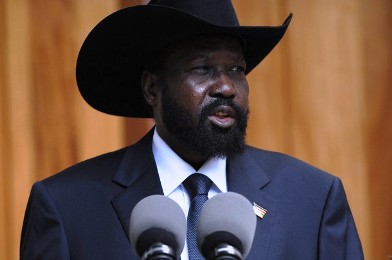S. Sudanese community accuses Kiir of “failing” nation
January 19, 2016 (JUBA) –The Phow community in South Sudan’s Upper Nile state have accused president Salva Kiir of allegedly failing to rule the young nation, months after the South Sudanese leader issued a republican order creating 28 new states.

In August last year, South Sudan’s ruling party (SPLM) and the armed opposition faction allied to former vice president, Riek Machar signed a peace deal to end the conflict that killed thousands and displaced millions.
James Tayien Koang, the leader of the Phow community in Uganda accused South Sudan government of “backstabbing” the peace agreement.
“The peace accord signed by the rival parties was to retain the 10 states that were constitutionally mandated by the legislative assembly of the Republic of South Sudan. There is no way for the government to work against the peace implementation,” Koang told Sudan Tribune.
He urges members of the international community and peace partners to put more pressure on both the government and the armed opposition.
“I humbly request peace lovers, negotiators, especially the IGAD-Plus, Troika, United Nations, UN Security Council and the African Union to keep monitoring the designation of ongoing peace process. We are calling upon them to protect the lives of the displaced people until peace is agreed an established by the rival parties,” said Koang.
Nyaluak Top Bamuom, the deputy chairperson of the Phow community condemned president Kiir’s “redline” over reservation on the 28 new states.
“The women and children of this country have been victims since day one of this conflict. Our leaders never think about the pain faced in this deadly crisis, therefore we are calling upon president Kiir to consider us and work for peace and reunite South Sudanese through viable peace,” she said.
She urged South Sudanese women within in the country and around the globe to bring their voices together to cooperate with IGAD, the South Sudanese government and SPLM-IO to bring peace in the war-torn nation.
“You know creating 28 states is a kind of encouraging those against peace to go out and mobilize for war and destabilise peace in the country,” said Nyaluak.
Par Chuol Kuek, a South Sudanese in Uganda separately told Sudan Tribune he remains skeptical about prospects for peace in South Sudan.
“If you look at South Sudanese at the moment, they are deeply divided into deadly tribal lines. We are not sure about peace, today you may hear different story and tomorrow another one, so we are not sure whether peace will be coming,” he said.
Jal Duop Yang, a law student at Kampala International University, says South Sudan can only improve if strong constitutional reforms were put in place.
“The completion of the constitutional amendment will guide and guarantee the implementation of the peace agreement, which is overseen by the Joint Monitoring and Evaluation Commission [JMEC] to ensure the two warring factions form the government of nation unity,” he said.
(ST)
